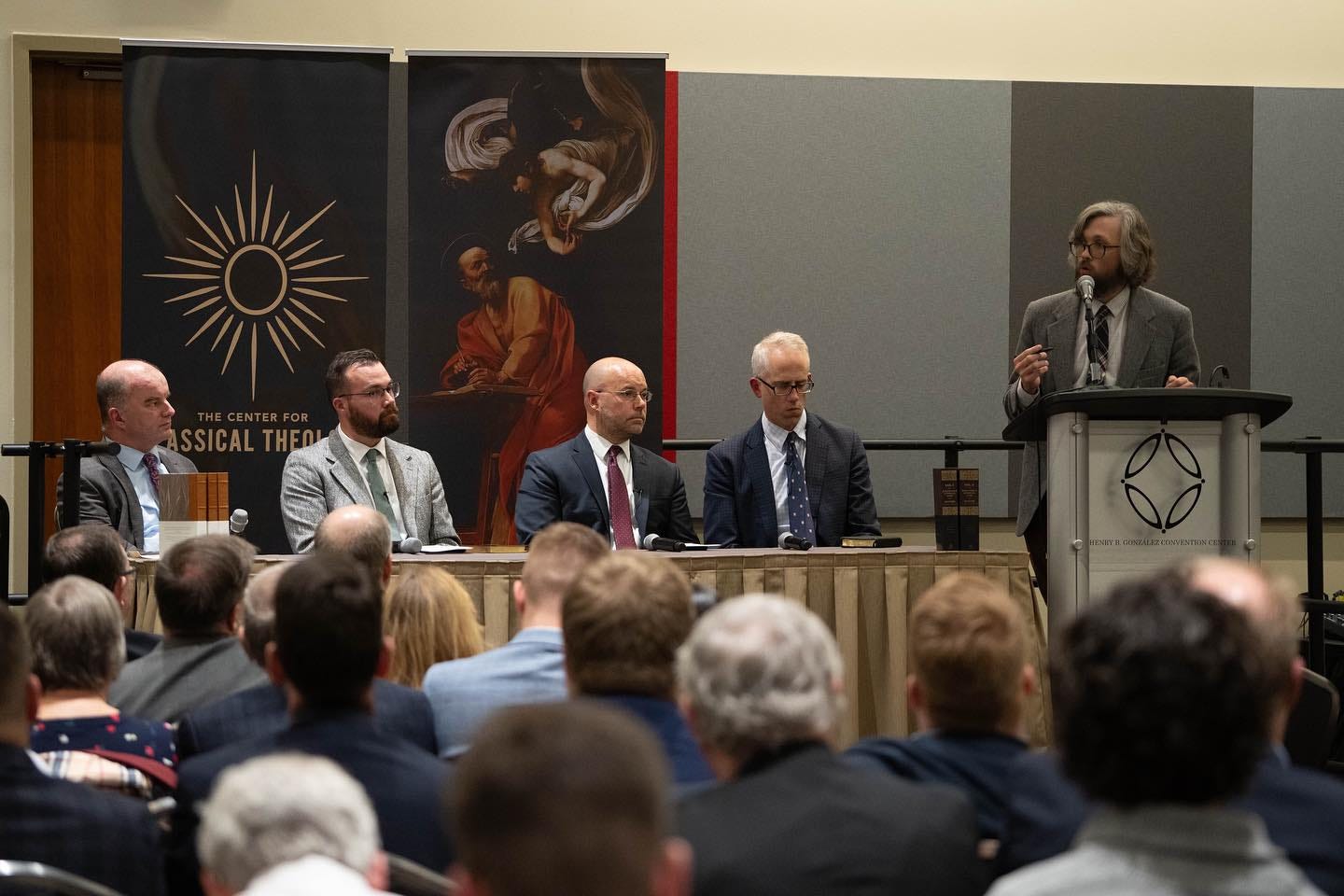Systematic Theology from Chalcedon to San Antonio
And what books I assigned for my Christology seminar
Can you believe Christmas is one month away? We have picked out a Christmas tree, our giant dancing Santa Claus is back, and the advent calendar is ready. We even took our girls to see Mariah Carey’s Christmas concert in Kansas City. Yes, I still need to put up the Christmas lights on the house, but it’s so cold (it snowed last week) that I’m waiting for warmer weather.
While I wait, here’s an update on my Systematic Theology with Baker Academic. I spent most of this Fall working through the historical development of Christology. It’s been a journey. I explain how Christology develops, from Logos Christology to Chalcedon, from Maximus to the Third Council of Constantinople. But do not be fooled: I’m not writing a historical survey. Rather, as I detail the development of Christology, I am asking how we, today, can retrieve the fathers to formulate Christology ourselves, especially with so many modern deviations from orthodoxy.
One more thing (that I will likely talk about in a future post): in my reading of the primary sources I have been so pleased to see first hand how everyone approached Christology from the perspective of divine impassibility. It’s truly ironic since so many evangelicals today reject or modify impassibility, but in the ancient world even the heretics affirmed impassibility. The real debate was not over impassibility but how an impassible divine Logos can take on flesh. Those on the side of the creeds used their biblical imagination to explain how the incarnate Son is true man without forfeiting his impassibility. Those whom the creeds oppose fail to provide an adequate explanation of this mystery. All in all, I hope my treatment of Christology gives students today the historical roots they need so that their Christology is defined by a catholicity.
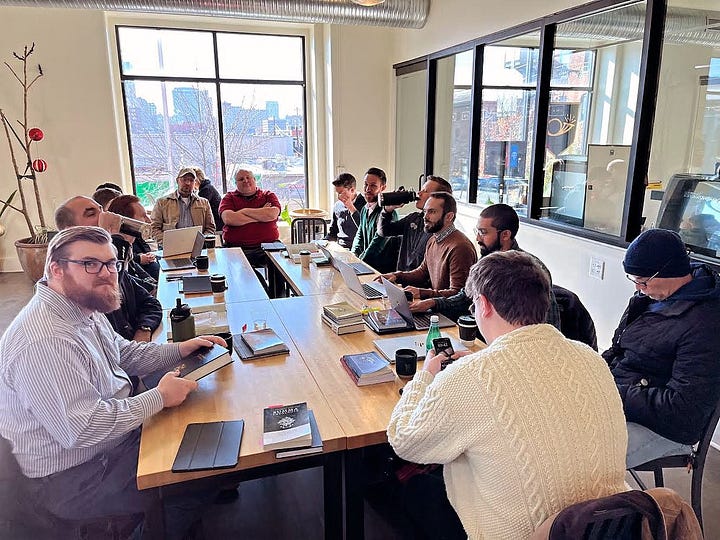
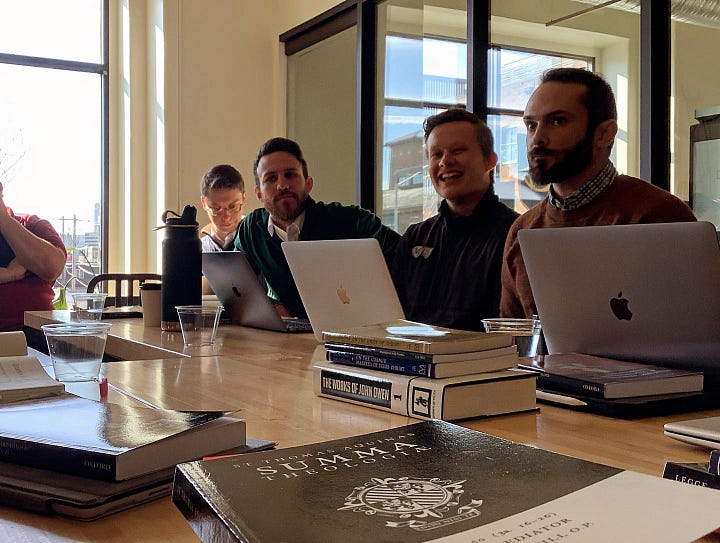
As it turns out, this semester my Christology PhD seminar meets at MBTS. I get asked a lot by those looking in what books my students are reading. Here is the reading list that occupies much of our Socratic dialogue this semester:
Primary Sources
Norris, Richard, trans. and ed. The Christological Controversy. Minneapolis: Fortress Press, 1980.
Hardy, Edward, ed. Christology of the Later Fathers. Library of Christian Classics. Louisville: Westminster John Knox, 1954.
Cyril of Alexandria. On the Unity of Christ. Trans. John Anthony McGuckin. Popular Patristics Series, Vol. 13. Crestwood, NY: SVS Press, 2015.
Maximus the Confessor, On the Cosmic Mystery of Jesus Christ. Trans. Paul M. Blowers & Robert Louis Wilken. Popular Patristics Series, Vol. 25. Crestwood, NY: SVS Press, 2003.
Maximus the Confessor. Disputations with Pyrrhus. St. Tikhon’s Monastery Press, 2014.
Allen, Pauline and Bronwen Neil, eds. Maximus the Confessor and his Companions: Documents from Exile. Oxford Early Christian Texts. Oxford: Oxford University Press, 2003.
Aquinas, Thomas. Summa Theologiae. 3a. 1-59. Volumes 48-55. Cambridge University Press, 2006.
Vermigli, Peter Martyr. Dialogue on the Two Natures in Christ. Trans. and Ed. By John Patrick Donnelly. Sixteenth Century Essays & Studies. Davenant Press, 2018.
Owen, John. The Works of John Owen. Volume 1, On the Person of Christ; Meditations and Discourses on the Glory of Christ; Meditations and Discourses on the Glory of Christ applied to Sinners and Saints. Edinburgh: Banner of Truth.
Secondary Sources
Alloys, Grillmeier. Christ in the Christian Tradition: Volume 1, From the Apostolic Age to Chalcedon (451). Atlanta: John Knox Press, 1964.
Daley, Brian E. God Visible: Patristic Christology Reconsidered, Changing Paradigms in Historical and Systematic Theology. Oxford: Oxford University Press, 2018.
Legge, Dominic. The Trinitarian Christology of St Thomas Aquinas. Oxford: Oxford University Press, 2018.
White, Thomas Joseph. The Incarnate Lord: A Thomistic Study in Christology. Thomistic Ressourcement Series. Washington, D. C.: CUA Press, 2017.
Weinandy, Thomas. Does God Change? Studies in Historical Theology. Peru, IL: St. Bede Abbey Press, 2002.
Butner Jr., D. Glenn. The Son Who Learned Obedience: A Theological Case Against the Eternal Submission of the Son. Eugene, OR: Pickwick, 2018.
Duby, Steven J. Jesus and the God of Classical Theism: Biblical Christology in Light of the Doctrine of God. Grand Rapids, MI: Baker, 2022.
McCormack, Burch Lindley. The Humility of the Eternal Son: Reformed Kenoticism and the Repair of Chalcedon. Current Issues in Theology, 18. Cambridge University Press, 2021.
McGrath, Alister. The Making of Modern German Christology, 1750–1990. 2nd ed. Eugene, OR: Wipf & Stock, 2005.
Drake, K.J. The Flesh of the Word: The extra Calvinisticum from Zwingli to Early Orthodoxy. Oxford Studies in Historical Theology. Oxford: Oxford University Press, 2021.
Articles and Select Readings
Dolezal, James E. Review of The Humility of the Eternal Son: Reformed Kenoticism and the Repair of Chalcedon, by Bruce Lindley McCormack. Evangelical Quarterly.
Dolezal, James E. “Neither Subtraction, Nor Addition: The Word’s Terminative Assumption of a Human Nature.” Nova et Vetera
Unfortunately, John Betz’s new book did not come out in time. However, my Philosophical Theology seminar in the spring will be reading it: Christ, the Logos of Creation: An Essay in Analogical Metaphysics.
But what else have I been up to since I last wrote?
Center for Classical Theology met in San Antonio
The inaugural lecture for the Center for Classical Theology was one of the highlights of my year! Seeing so many of you show up in San Antonio, eager to hear about classical theology, connecting with fellow theologians and encouraging one another—well, this is what CCT is all about. Carl Trueman gave a moving lecture, explaining why classical theology is the antidote to expressive individualism.
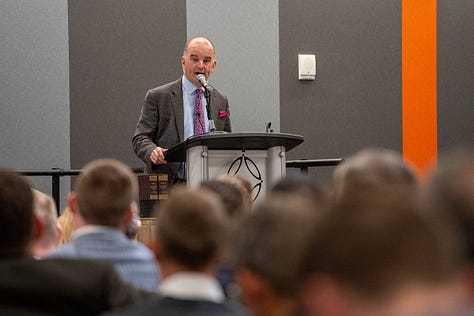
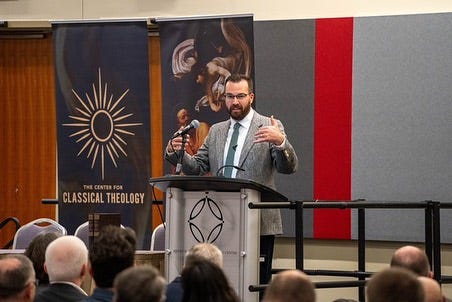
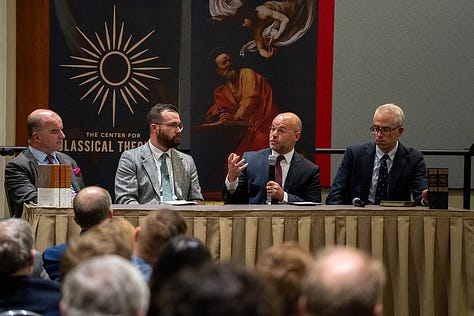
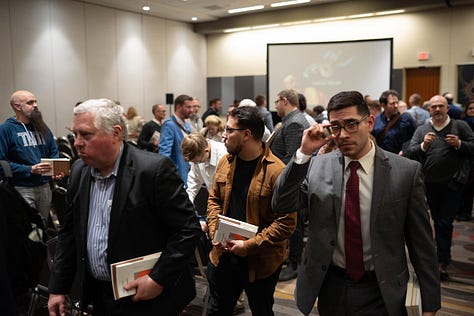
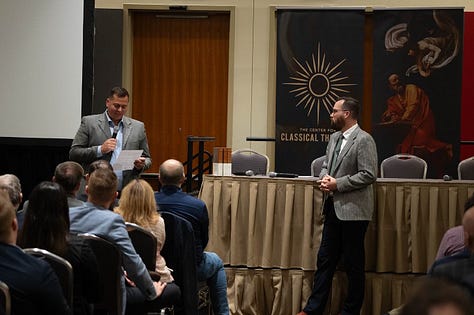
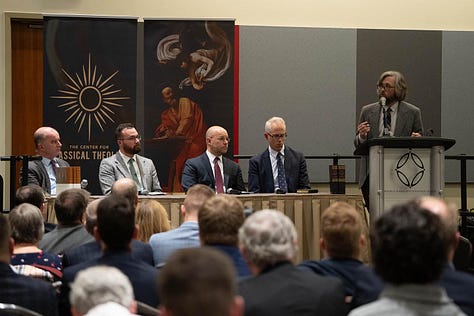
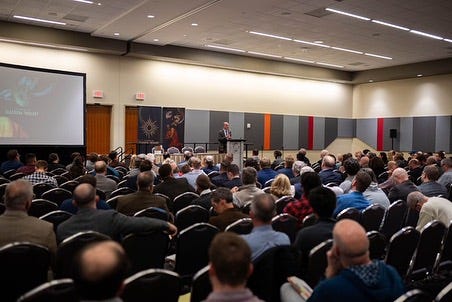
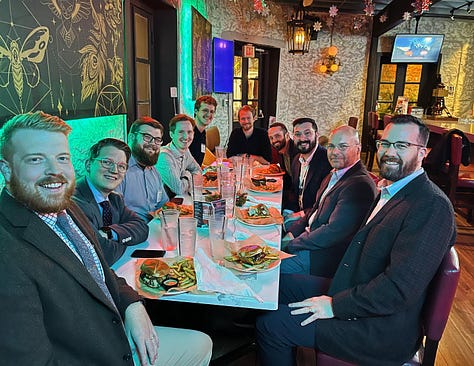
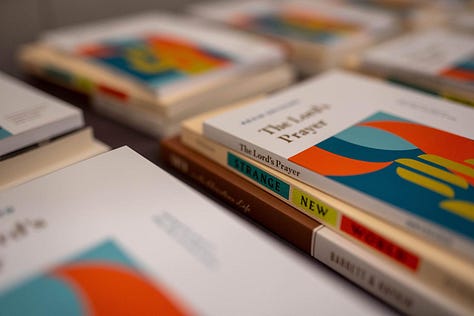
His summons to retrieve orthodoxy and embrace confessionalism needed to be heard in a room full of evangelicals. I also enjoyed the panel as Kevin DeYoung applied classical theology to pastoral ministry and James Dolezal added some philosophical vigor to the conversation. (I didn’t expect the question on baptism! So, James and I tried to represent the Baptists out there, even using the development of doctrine to buttress our case. I don’t think I persuaded Carl.)
I must say, the strangest thing happened. When Carl started contemplating God a halo appeared over his head. Or maybe it happened when he started talking about Thomas Aquinas? If you don’t believe me, here’s proof (thanks to Lee Gatiss):
The videos of the lecture and Q&A will go up on the Credo website this December. I hope you will join us next November 2024 because it will be another lively event, this time with one of the great theologians of our day, Michael Horton. Join us in San Diego. And seriously, if God drops a big donor in our lap, I think we will need to provide In-N-Out burger for all who come, don’t you?
Augustine, Union with Christ, and the Biblical Theology Podcast
On the Credo Podcast I talked to Phillip Cary about Augustine’s City of God. Truly, this is one of the greatest classics in the history of Christianity. If you would like help, listen in as Cary tells you why Augustine wrote an apologetic for Christianity when Rome was falling. Also, I teamed up with Credo Fellow Gavin Ortlund and we talked to J. Todd Billings about participation and union with Christ.
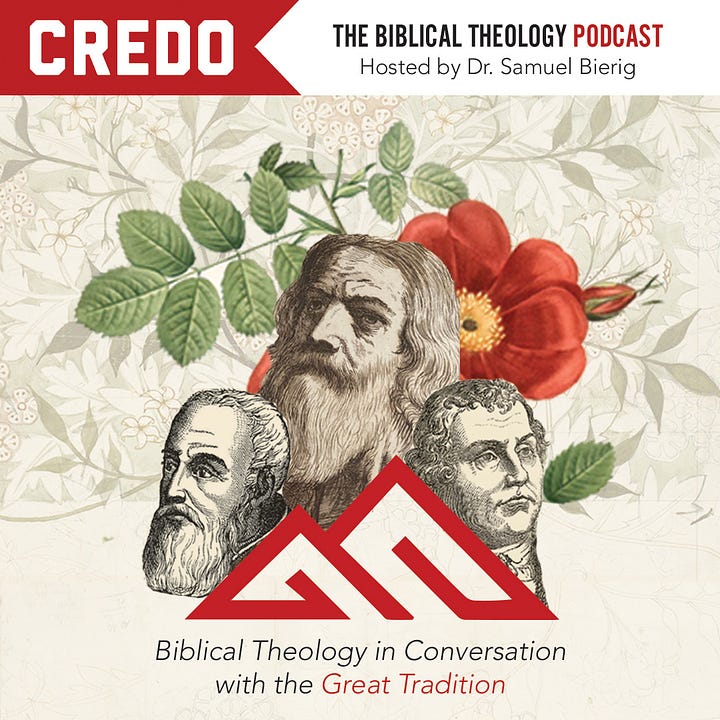
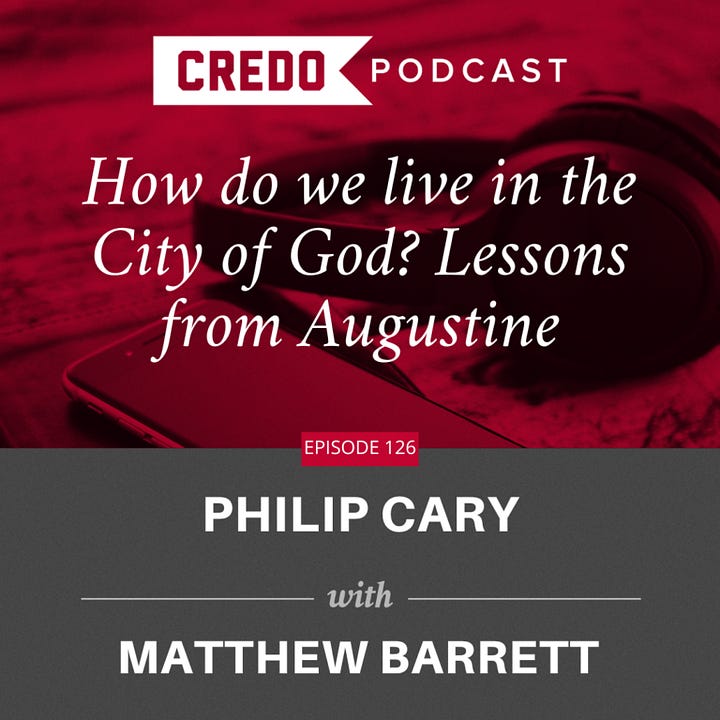
But one of the most important new projects to launch since I last wrote is the Biblical Theology Podcast, hosted by Sam Bierig. Biblical Theology is quite popular today, but few do biblical theology in conversation with the Great Tradition. Bierig has four episodes out already! For example, he talked to Jonathan Pennington about a trinitarian reading of the Gospel of Matthew. I kicked off the podcast with a discussion of John Calvin’s theological reading of the scriptures via his Institutes.
The next issue of Credo Magazine releases soon. Lectio Divina will be our topic. Check Credo next week to read the full issue.
I’m Matthew Barrett. Until next time, do explore Credo Magazine, meet other theologians on the Credo Podcast, and participate in the Center for Classical Theology. You can follow me on twitter: @mattmbarrett




